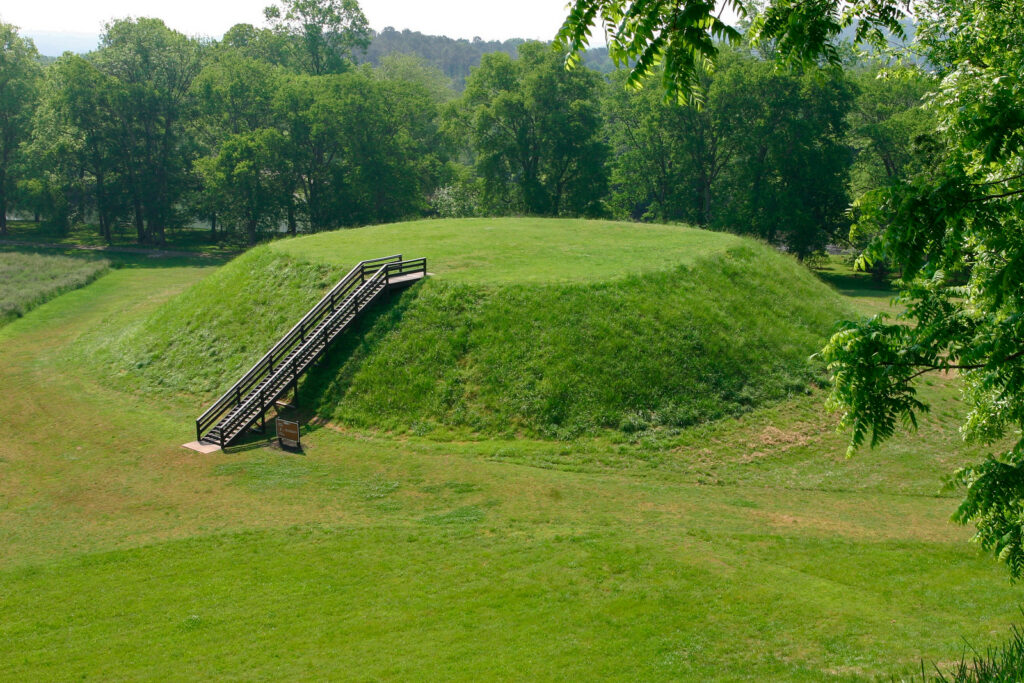Bartow County was formed from Cherokee County on December 3, 1832.
It was originally called Cass County for General Lewis Cass, secretary of war under U.S. president Andrew Jackson and the man most responsible for the removal of the Cherokee Indians from northwest Georgia. Cass sided with abolitionists during the Civil War (1861-65), however, and in 1861 the county was renamed in honor of the first Georgia officer to fall on the field at Manassas, Virginia, Colonel Francis S. Bartow.
Before white settlement, a Native American population included Woodland Indians, Mississippian Mound Builders, Creeks, and Cherokees, who flourished in the fertile plains of the Etowah Valley for thousands of years. A remnant of one of these cultures, the Etowah Indian Mounds, is a state historic site.

Attracted by abundant natural resources and the promise of gold, white settlers acquired land through the 1832 land lottery and the 1832 gold lottery. The county seat of Cassville was laid out the next year and incorporated in December 1843. It was destroyed during the Civil War by Union forces in November 1864, and the county seat was moved to Cartersville, the next largest municipality, in 1867. Other municipalities include Adairsville, Emerson, Euharlee, Kingston, Taylorsville, and White.
The Western and Atlantic Railroad (W&A), which paralleled present-day Interstate 75 from Atlanta to Chattanooga, Tennessee, played a significant role in the early development of the county. During the Civil War, the W&A was the Confederacy’s main corridor through northwest Georgia and was of some strategic value during Union general William T. Sherman’s campaign for Atlanta. One of the shortest and bloodiest battles of the war was waged at the deep cut of the railroad at Allatoona Pass. The W&A also figured prominently in the Great Locomotive Chase (also known as the Andrews Raid), which ran through Bartow County.

The Civil War brought numerous skirmishes to the county, particularly in the areas of Kingston and Cassville, where Confederate cemeteries were established. In 1865 the last remnant of the Confederate army east of the Mississippi was paroled at Kingston.
A huge iron belt that runs north to south, almost through the entire eastern length of the county, supported a flourishing iron industry from the 1840s to the 1870s, and evidence of many iron furnaces remains. Chief among iron producers was the Etowah Manufacturing and Mining Company at Etowah, where Cooper’s Furnace remains. Iron is no longer mined, but mining and processing of other ores continues. New Riverside Ochre and Vulcan Materials are the largest mining industries currently in operation in the county.

Other major industries include Shaw Industries and Anheuser-Busch. Bartow County also serves as the corporate headquarters for Phoenix Air. Until the mid-1970s cotton remained the main crop in this largely agricultural county.
Bartow County is home to Red Top Mountain State Park and Lake Allatoona, which occupy a large portion of the southeast corner of the county. The first African American state park, George Washington Carver, was located in Bartow; it became part of Red Top park in 1975. Historical attractions include nineteen National Register listings, among them Adairsville Historic District, Etowah Valley District, and the North Erwin Street and North Wall Street Historic Districts in Cartersville. The county boasts the first outdoor Coca-Cola wall sign, the Euharlee Covered Bridge, and the Friendship Monument in Cartersville. Cultural attractions include museums, performing arts centers, and theatrical companies. Bartow County also hosts the annual Atlanta Steeplechase at Kingston Downs. A campus of Chattahoochee Technical College and a satellite campus for Georgia Highlands College are located in the county, both in the town of Acworth.

Notable people from Bartow County include the evangelist Sam Jones, humorist Bill Arp, novelists Corra Harris and Francis Goulding, Baptist missionary Lottie Moon, iron pioneers Jacob Stroup and Moses Stroup, iron industrialist Mark Cooper, major league baseball player Rudy York, Hall of Fame horse trainer Huratio Luro, and Confederate generals P.M.B. Young and William Wofford. Distinguished politicians include the first woman U.S. senator, Rebecca Latimer Felton; Senator Jefferson Davis; U.S. attorney general Amos T. Akerman; former chief justice of the Georgia Supreme Court, Robert Benham; former governor Joe Frank Harris; U.S. Congressman William Felton; and member of the Confederate congress Warren Akin Sr.
According to the 2020 U.S. census, the population of Bartow County is 108,901, an increase from the 2010 population of 100,157. As the metropolitan Atlanta area expands, Bartow County’s continued growth is assured.



